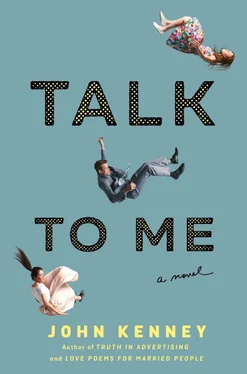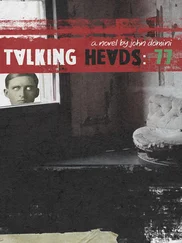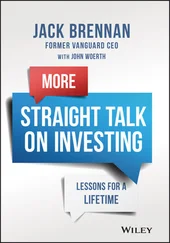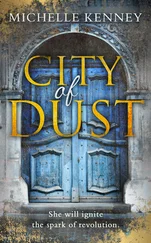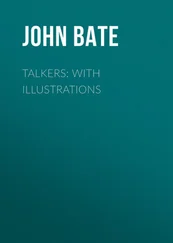Just keep watching.
We go live now to Ted Grayson in New York.
Three weeks earlier and Ted is in a mood.
“Ninety seconds, Ted.”
It was Lou, in Ted’s earpiece. Ted’s executive producer, Lou Arno.
They were in the middle of a two-and-a-half-minute commercial break, twenty-one minutes into the broadcast. One story left.
“The Triangle package,” Lou said. “Your lead-in, the prerecorded piece. You’ll have eight seconds after the story. You’ll have copy. Not that you need it. It’s almost like a real job.”
Something about this last bit annoyed Ted. It was something Lou had said before, in his harmless Lou voice. But there was an edge to it. Or was Ted’s bad mood filter adding the edge? He wasn’t sure. Either way, it further unsettled his already stormy insides.
Ted glared in the direction of the control room, then reached for his cell phone under the desk. He checked emails, texts. There was one from Claire.
In Bedford. Please stay in city. Might be best to speak through lawyers at this point. Also, happy birthday.
If that didn’t say love, what did? Ted thought. Almost thirty years of marriage.
There was a text from Polly, Ted’s agent and attorney, asking if they were still on for dinner. Polly Klein (née Paulette, a name she loathed) would meet him at Cafe Luxembourg at eight.
“Roger that?” Lou asked.
Lou could see Ted from the control room, through the glass, as well as on the live feeds from the two cameras on set. He could also look up at a wall of ten monitors showing live feeds from some of the affiliates on the East Coast.
“Swell,” Ted said. He was supposed to say “Roger Mudd.” It was a thing he and Lou said. Roger Mudd was a newscaster years ago who did a famous interview with Senator Ted Kennedy, who had announced that he was running for president. Mudd asked Kennedy why he wanted to be president. Kennedy looked flummoxed, fumbled around for words. Some say it cost him the nomination against then president Jimmy Carter in 1980.
Now, for some reason, Ted didn’t feel like saying it. The whole thing, the saying of it, annoyed and embarrassed him.
“What’s wrong, Teddy?” Lou pushed.
Ted turned to raise his middle finger to Lou but instead knocked over his water, soaking his script and a goodly portion of his pants. He heard Lou laughing, which only pissed him off more. A production assistant ran over with a roll of paper towels, dabbing the desk and then, awkwardly, Ted’s wet lap. A sweet young kid name Greg. Or Larry. He wasn’t sure. Overeager.
“Okay, okay,” Ted barked, regretting his tone immediately.
The poor kid reacted like a scolded dog. “Sorry. And, um, happy birthday, Mister Grayson,” he managed with a smile as he scampered off.
“Oh, that’s right,” Lou said, fully aware that it was Ted’s birthday. “Happy seventieth,” he added, chuckling.
Lou was a difficult-to-determine fifty-nine, rail thin, an early-morning runner, poor sleeper, bald since the age of twenty-four, crew cut on the sides and back. Khakis, a polo shirt tucked in, and running shoes every day. In the winter, a fleece vest. A fast blinker, eyes darting. He had a hard time relaxing. But then, that was his job. Grace under pressure. A constant state of ready for the unexpected. The late feed. The botched feed. The live report gone bad. The show that was running short and needed to be lengthened. The show that was running long and needed to be cut. The breaking news story halfway through a broadcast. The raw rush of live TV. Lou loved it. He had been with the broadcast three years, having replaced Ted’s longtime producer Roy Wilson, who retired after his third heart attack. Lou had hoped that he and Ted might become close. To date it hadn’t happened.
Lou looked at his own phone, which seemed to beep nonstop. Links and feeds and reporters in the field, updates, weather, police scanner, fire scanner, White House, State House, London Bureau, Jerusalem Bureau, Jo-Burg, Moscow, Hong Kong, Beijing. Lou checked his phone and then looked back up, watching Ted, who—Lou could feel it—was in a mood. Lou would remember this, weeks later, months later. And not just because Lou had a bizarre memory for details, numbers, chronology. In the endless retelling to the initially small internal review board, then later to the larger investigative committee (the goddamned East German Stasi, if Lou were honest about it), to friends, to colleagues, to a reporter for the New York Post , in a moment of candor he regretted and was partially misquoted on (to his eternal regret and shame), and mostly to Phyllis, his wife, who listened as Lou held a large scotch and stared off into the backyard, when it still seemed so unreal.
Ted would remember it, too, of course. Though he would remember it differently and always with the makeup woman. The replacement. Natalia.
• • •
“The king is in a foul temper,” Murray said to no one in particular. He sniffed his fingertips, a thing he did that annoyed his two colleagues, one of his many tics. Scratching his head aggressively. Poking at his inner ears. Sniffing his fingers. The traits of a man who lived alone.
Grace ignored him and continued typing. Jagdish looked up, smiled the kindly smile one might offer a child who’d just said, “Look, Dad! I put on my underpants all by myself.” He then looked back at his computer.
Ted’s newswriting staff. Or what was left of it. They were in a small room a floor above the studio, a window overlooking Midtown. It was dark and the lights of the buildings dotted the skyline. Murray loved the view.
Where once, twenty years ago, there were eight or nine of them, now it was this little band of brothers and one sister. And rumor had it that there were further redundancies planned. A bank of flat-screens sat above one wall, each showing the major networks, along with CNN and Fox, all in commercial break before their final story. A smaller closed-circuit monitor showed a live feed from the newsroom and Ted’s $11 million hair being tended to.
Grace said, “I’m making a change to the story.”
“Too late,” Murray said, suddenly excited, in part because he loved when Grace did this, her last-minute changes that made a difference only to Grace, and also because she was speaking to him.
“Tell Lou. I’m sending now.”
Grace looked up at Murray and Murray picked up the phone. If Grace had said, “Hang from the outside ledge of the window naked,” he would have done it.
Lou picked up mid-ring.
“Little change coming through. Sending to prompter now.”
He hung up.
Jagdish got up. “May I?” he asked Grace.
Grace smiled and Murray felt sick. Why couldn’t she smile like that at him?
Jagdish read over Grace’s shoulder.
“Soulful.”
Jagdish had been born to a well-to-do family in Bombay and studied in London. He’d done graduate work (philosophy and religion) at NYU. He was planning his escape from newswriting, taking night classes in massage therapy with a focus on the fascia. Jagdish was convinced the fascia held the mysteries of life.
Murray got up and came over, read over Grace’s other shoulder. The story was about the anniversary of the Triangle Shirtwaist Factory fire. Grace had rewritten the intro, the body of the story, and Ted’s closing a dozen times over the past three days.
Murray wore T-shirts with ironic sayings. “Serial Chiller.” “King of Nothing.” “Stay Sassy.” He looked a bit like someone who hung around Washington Square Park waiting for a chess game. Dirty fingernails, which he often bit and stared at, protruding belly, ring of unkempt hair around a bald pate, skin a bizarre color of yellow. He knew every capital in the world and had yet to be stumped. He could name all of the countries in Africa alphabetically. He secretly worshipped Ted and sometimes wondered what it would be like to be him. He’d gone to Harvard, Harvard Medical, quit halfway through, though he was on track to graduate at the top of his class. Then decided upon Columbia Law, where he was head of the law review, even though he had no intention of ever practicing law. His parents were scions of the Merck fortune. He lived alone on the Upper West Side in a rent-stabilized apartment. He wrote science-fiction novels, which he refused to send out to publishers. He felt the system was rigged, that Congress was enslaved to corporate interests, that mortgages were a scam, that banks were fundamentally illegal, that government was corrupt, and that culture had died. He was in charge of the newswriting staff.
Читать дальше
